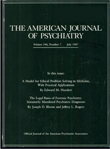Cardiovascular Effects of Fluoxetine in Depressed Patients With Heart Disease
Abstract
OBJECTIVE: The purpose of this study was to determine the cardiovascular effects of fluoxetine in depressed patients with cardiac disease. METHOD: Twenty-seven depressed patients (26% of whom were female and whose average age was 73 years) who had congestive heart failure, conduction disease, and/or ventricular arrhythmia were studied in an open medication trial of fluoxetine, up to 60 mg/day, for 7 weeks. The main outcome measures were heart rate and rhythm measured by 24-hour ECG recordings, ejection fraction determined by radionuclide angiography, cardiac conduction intervals, and blood pressure. Baseline values were compared with those at weeks 2 and 7 of fluoxetine treatment. In 60 comparable patients, values of these same cardiovascular measures at baseline and after 3 weeks of treatment with a tricyclic antidepressant, nortriptyline, were also examined. RESULTS: Fluoxetine induced a statistically significant 6% decrease in heart rate, a 2% increase in supine systolic pressure, and a 7% increase in ejection fraction. There was no effect on cardiac conduction, ventricular arrhythmia, or orthostatic blood pressure. Overall, 4% of the fluoxetine patients had an adverse cardiovascular effect. In contrast, nortriptyline treatment caused a significant increase in heart rate and orthostatic hypotension, and 20% of the nortriptyline-treated patients had an adverse cardiovascular effect. CONCLUSIONS: In depressed patients with heart disease, fluoxetine treatment was not associated with the cardiovascular effects documented for the tricyclic antidepressants or with significant adverse cardiac events. However, limited conclusions about fluoxetine's cardiovascular effects and safety can be drawn from this study of only 27 patients monitored for 7 weeks.



